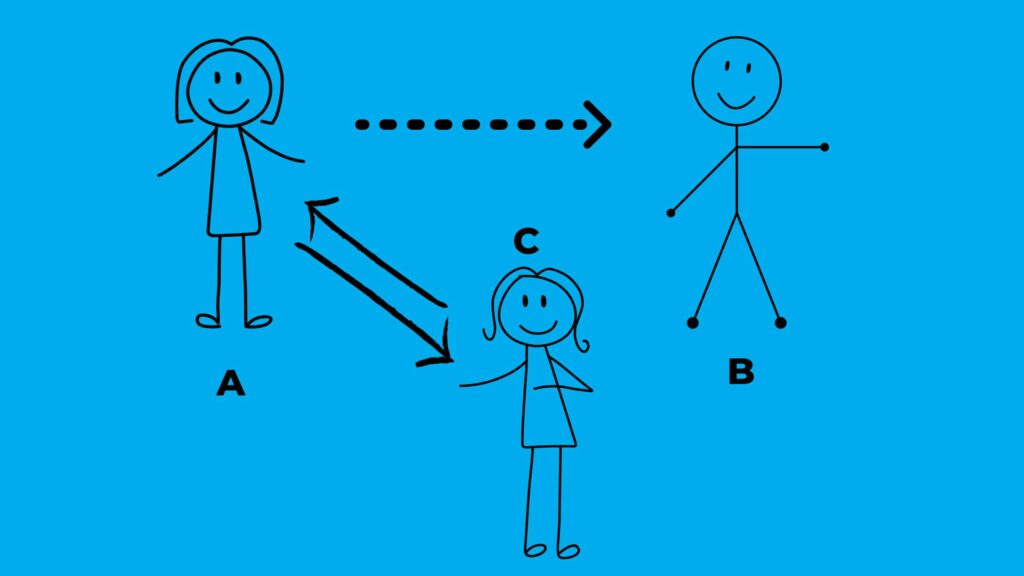Triangulation is an intimidating word. It is used in scientific research and cartography to mean the process of using triangles to measure otherwise unmeasurable distances. However, this word is also used quite frequently in the mental health field. In this context, the meaning might be even more daunting.
What is Triangulation?
Triangulation occurs in our relationships when a member of a couple turns to a third party instead of their partner for advice, comfort, support, and/or validation. Often, triangulation is used as a manipulation tactic where one person will not communicate directly with their spouse, instead bringing in a third party. But even more often, we aren’t trying to purposefully manipulate our spouse. Instead, we are simply returning to our pre-marriage habits. Having outside support is wonderful, but when it comes to problems specific to your marriage seeking comfort outside of your spouse can jeopardize the intimate foundation of your relationship.
I warned you this would be a daunting subject. Triangulation happens at some point in almost all marriages. However, the good news is that there is a clear path to ending triangulation and opening up better lines of communication with your spouse.
What does Triangulation look like?

Triangulation is when Partner A turns to Person C and they combine against Partner B. A marriage is meant to be the union of two people, a third threatens that relationship. Here’s an example of how this plays out.
Bill and Jean get home from a long day at work. Bill was supposed to make dinner, but after getting yelled at by his boss he just wants to relax. He says, “Honey, I’m just going to order a pizza for us”. Jean is annoyed that Bill isn’t upholding their agreement to make dinner. But she doesn’t want to start something, so she eats in silence and goes to bed early. The next day, Jean’s mom calls her to check in. Jean complains about Bill never making dinner when he is supposed to. Jean’s mom, wanting to protect her baby, says something like, “Jean you can’t let him treat you like that!” Now, Jean feels comforted and validated, but is more convinced that she is right and that Bill is wrong.
Later, this situation could escalate. Jean may say to Bill, “You never do anything around here! Even my mom thinks so”! Bill had no idea how Jean was feeling because she didn’t tell him. Bill may now feel hurt (what has Jean been telling people?) and will most likely become defensive.
Do you recognize this pattern? Jean and her mother, without trying to, have joined against Bill. Bill now feels the need to defend himself from his wife instead of feeling like he is working with her.
When does it happen?
Let me be clear, even a married person needs friends. No marriage is an island. We all need girl/guy friends to hang out with. In addition, our extended families can lend much needed support and are important relationships to maintain (in most cases).
Triangulation is not simply finding support outside your marriage relationship. It’s joining with someone against your spouse.
Parents

As mentioned above, this happens a lot with parents. For many of us, we grew up relying on our parents. We have always been able to count on them to choose our side, to fight our bullies, to give us confidence against our problems. And no matter how old we get, it can be hard for parents to let go of the urge to protect their kids from anything that is making them sad.
Once we get married, it can be hard to learn a new way of being. We need to find a new balance between our relationship with our parents and our relationship with our spouse. Before we find a balance, there may be some moments we feel like we are floundering. These moments can be scary, and we may be tempted to return to our old comfort place (read more about Homeostasis here). In this case, we may get scared by a fight with our spouse or some disagreement and we seek comfort with our parents, who are trained to protect us from those who make us sad. But this time it’s not a playground bully, it’s your spouse!
Friends
We can also experience triangulation with friends, siblings, co-workers, etc. We do this a lot when we are just hanging out, chatting. Too often, we end up complaining about our spouses in these conversations. For example, Jean may say to her friends, “Oh my gosh I hate it when Bill leaves the toilet seat up. It’s so gross!” and her friends might reply, “Oh wow that is the worst! It’s so inconsiderate of him”. Now, Jean sees Bill’s forgetfulness as an attack. And Bill feels a betrayal of trust when he finds out Jean has been gossiping about him.

How do We Change the Pattern?
So how do we stop triangulation? It starts by cleaving to your spouse. The scriptures say, “therefore shall a man leave his father and his mother, and shall cleave unto his wife” (Gen. 2:25) In the dictionary, cleave has two meanings; to join together and separate fully. In order to cleave to our spouse, we need to leave father and mother (and friend). You and your spouse will create a family that is separate from both of your family of origins. This may look different in every relationship, but in any situation you need to create a boundary around the places you won’t let others into.
Talk with your spouse about where to set boundaries. What topics of conversation are off limits? Most couples agree that the details of their sex life, what they argue about, and things they feel insecure about should remain off limits.
Once you have set those boundaries, hold the line. Well meaning friends and family members will want to know. They want to help and take care of you. But you need to be the one to hold boundaries around your marriage.
Some families make setting boundaries difficult. The scriptures make it clear that to cleave, we must leave. Sometimes, to cleave to your spouse you need to leave your parents physically, relationally, emotionally, financially, spiritually, and maybe even geographically. Be thoughtful and prayerful as you consider with your spouse what boundaries need to be created around your marriage.
When You Need Outside Help

Sometimes, it feels like you need someone else to talk to. You can get stuck in your relationship and feel like you are running in circles. If you do need help, discuss together who you trust. If at all possible, talk to that person together. A great option is to find a good coach or therapist. Coaches have a lot of practice not taking a side, but validating both sides and helping the couple work together to a happier state of being.
The key to avoiding triangulation is talking to your spouse. Set boundaries with your spouse around your relationship and protect that sacred space. Even when well meaning friends and family try to butt in, remember it’s your responsibility to cleave to your spouse. If you need some help defining or holding those boundaries, reach out to our awesome coach for some non-triangulated help.
Written by Amanda Severson with Get Your Marriage On!






